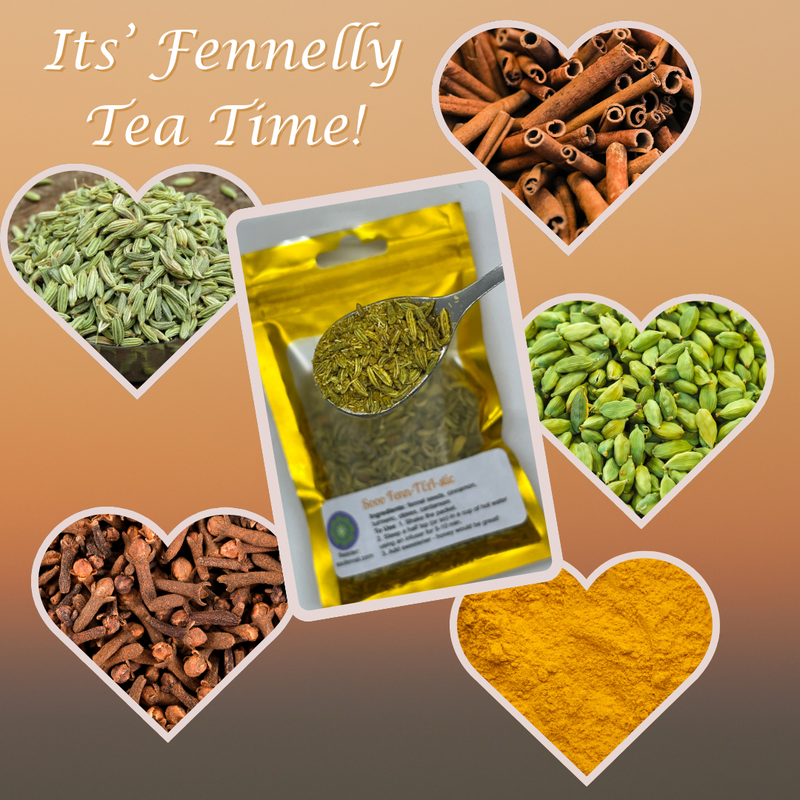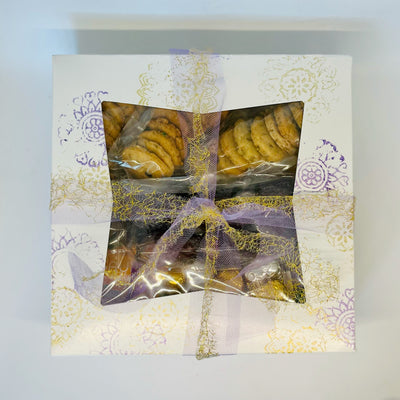
Fennel Tea: The Unsung Hero of Your Digestive System and So Much More!
There’s a secret superstar in your spice cabinet, probably sandwiched between the cinnamon and the cumin. It doesn’t ask for much attention, but it’s always there, waiting patiently for its moment to shine. That humble seed is none other than fennel! And when it’s brewed into a soothing cup of fennel tea, it becomes a multitasking health elixir that can do everything from taming your digestion to making your breath smell fabulous.
So, pour yourself a cup, sit back, and let’s explore the delightful, slightly anise-flavored world of fennel tea. In this post, we’ll dive into its health benefits, ways to prepare it (beyond just the basic brew), and why this tea is revered in kitchens and teahouses across the globe.
What’s the Big Deal About Fennel?
First things first—what is fennel, and why does it deserve a spot on your tea shelf?
Fennel (Foeniculum vulgare) is a hardy, aromatic plant from the carrot family, but its taste might make you think of licorice more than root veggies. Its seeds, which are small, ridged, and pale greenish-brown, are where all the magic happens for fennel tea.
Historically, fennel was used in ancient civilizations like Greece and Rome for its medicinal properties, but also because, well, it’s delicious. Fast-forward to the modern day, and fennel is still loved around the world—though now, we know much more about its incredible health benefits, especially when brewed into a tea.
The Health Benefits: Fennel Tea, Your New Best Friend
1. Digestive Dynamo
The most famous benefit of fennel tea is its ability to aid digestion. You know those times when you’ve had a little too much pizza, and now your stomach is making noises that sound like a tiny, angry bear? Enter fennel tea.
Fennel contains compounds like anethole, fenchone, and estragole, which help relax the muscles in your digestive tract. This means it’s great for soothing cramps, reducing bloating, and even helping with constipation. Drinking fennel tea after a heavy meal can keep your digestive system humming along smoothly and spare you from post-meal regrets.
2. Gas and Bloating Buster
If your belly sometimes resembles a hot air balloon (but not in a cute way), fennel tea is a natural remedy to ease gas and reduce bloating. The tea helps break down food more efficiently and reduces the amount of gas your body produces during digestion.
Some cultures, like in India, chew on fennel seeds after meals to ward off bloating and promote good digestion. Fennel tea can do the same job, but in a way that's much more enjoyable and soothing.
3. Fresh Breath, Naturally
While you’re sipping your fennel tea to ease digestion, you’ll also be inadvertently freshening your breath! Fennel is a natural antimicrobial, meaning it can help kill the bacteria in your mouth that cause bad breath.
Just think of fennel tea as a mouthwash you can swallow—refreshing, right?
4. Hormonal Harmony
If PMS has you on an emotional rollercoaster every month, fennel tea could help smooth things out. Fennel contains phytoestrogens—compounds that mimic estrogen in the body. These can help regulate hormone levels, potentially easing symptoms like menstrual cramps, mood swings, and bloating.
5. Immune System Support
Fennel tea contains vitamin C, which can give your immune system a boost. It also has antimicrobial properties, which might help your body fend off minor infections. So, if you’re feeling under the weather or fighting off the start of a cold, fennel tea might offer a gentle, natural assist.
6. Detoxification Station
Fennel is a mild diuretic, meaning it encourages your body to eliminate excess water and toxins. If you’re feeling puffy or retaining water, a cup of fennel tea can help reduce that bloated feeling and encourage your body to detox naturally.
How to Brew the Perfect Cup of Fennel Tea (and Spice It Up!)
Brewing fennel tea is incredibly simple, but don’t stop at just the basics—there are plenty of ways to add your own flair! Here’s how you can make your perfect cup, plus some fun ingredients to take your tea to the next level.
Basic Fennel Tea Recipe
Ingredients:
-
1 to 2 teaspoons of fennel seeds
-
1 cup of hot water
Instructions:
-
Crush the fennel seeds lightly with a mortar and pestle or the back of a spoon to release their oils.
-
Bring water to a boil and pour it over the crushed seeds.
-
Let it steep for 5 to 10 minutes.
-
Strain the seeds out, and voilà—your fennel tea is ready to sip!
Jazz It Up: Flavorful Variations
1. Fennel and Mint Tea
Mint adds an extra layer of digestive power and a refreshing twist to fennel’s natural flavor. Simply add a few fresh mint leaves to your fennel tea while it’s steeping for a cool, crisp blend.
2. Fennel and Ginger Tea
For a little more spice and a stronger stomach-soothing effect, add a few slices of fresh ginger to your brew. Ginger and fennel are both excellent for digestion, making this a great option after a big meal.
3. Fennel and Honey-Lemon Tea
If you want a sweeter, more citrusy tea, add a teaspoon of honey and a squeeze of lemon juice. This is perfect for a sore throat or when you’re feeling a bit rundown.
4. Fennel and Chamomile Tea
Chamomile is known for its calming properties, making this blend ideal for winding down before bed. Just mix equal parts fennel and chamomile flowers, and you’ll have a gentle tea that soothes both your stomach and your mind.
5. Fennel Chai
For a fennel-infused take on chai, brew your fennel tea with black tea, cinnamon sticks, cardamom pods, and a few cloves. Add a splash of milk for a creamy, aromatic tea that’s full of flavor and warmth.
Where Fennel Tea Reigns Supreme: A Global Tour
Fennel tea’s popularity isn’t confined to just one corner of the world—this humble seed has made itself at home in many cultures. Let’s take a quick world tour of fennel tea’s hotspots.
1. India
In India, fennel seeds (locally known as saunf) are a mealtime staple, often chewed after meals to freshen the breath and aid digestion. Fennel tea is also a common home remedy for indigestion, bloating, and even for calming colicky babies.
2. Italy
In Italy, fennel is often used in savory dishes, but fennel tea also has its place as a digestive aid. Italians are known for their love of post-meal liqueurs like amaro, but fennel tea offers a non-alcoholic way to finish a meal and settle the stomach.
3. Greece and the Mediterranean
The ancient Greeks used fennel for its medicinal properties, and today, it’s still common in many parts of the Mediterranean. In places like Greece and Turkey, fennel tea is enjoyed both for its taste and its ability to soothe digestive issues.
4. Egypt
In Egypt, fennel tea has long been used for its medicinal properties. It’s often given to new mothers to help stimulate milk production, and it’s a go-to remedy for gas and bloating.
5. China
While green tea dominates China’s tea culture, fennel tea has a niche following, especially for its ability to help with digestive discomfort. It’s commonly included in traditional Chinese medicine for its anti-inflammatory and detoxifying properties.
The Digestive Benefits: Why Fennel Tea is Your Gut’s Best Friend
Let’s circle back to what fennel tea does best: taking care of your digestive system. Whether you’re dealing with gas, bloating, indigestion, or even cramps, fennel tea is like a warm hug for your insides.
How It Works:
-
Relaxing the Digestive Tract: Fennel’s volatile oils help relax the smooth muscles of the gastrointestinal system. This reduces spasms and cramps, allowing food to pass through more easily and reducing gas build-up.
-
Stimulating Digestive Enzymes: Fennel also encourages the production of gastric juices, which aids in breaking down food more efficiently. This helps prevent bloating and indigestion.
-
Preventing Constipation: Fennel tea acts as a mild laxative, making it a helpful remedy for constipation.
When to Drink Fennel Tea for Digestive Benefits:
-
After meals to help break down food and reduce gas.
-
Before bed if you’ve had a heavy dinner and want to prevent late-night discomfort.
-
Whenever bloating strikes—even sipping a small cup of fennel tea can help calm things down.
Wrapping It Up: Fennel Tea—Your Trusty Digestive Sidekick (and More)
There you have it! Fennel tea is more than just a trendy herbal brew; it’s a time-tested, multipurpose remedy that has been soothing bellies and freshening breaths for centuries. Whether you drink it to aid digestion, for its hormonal




